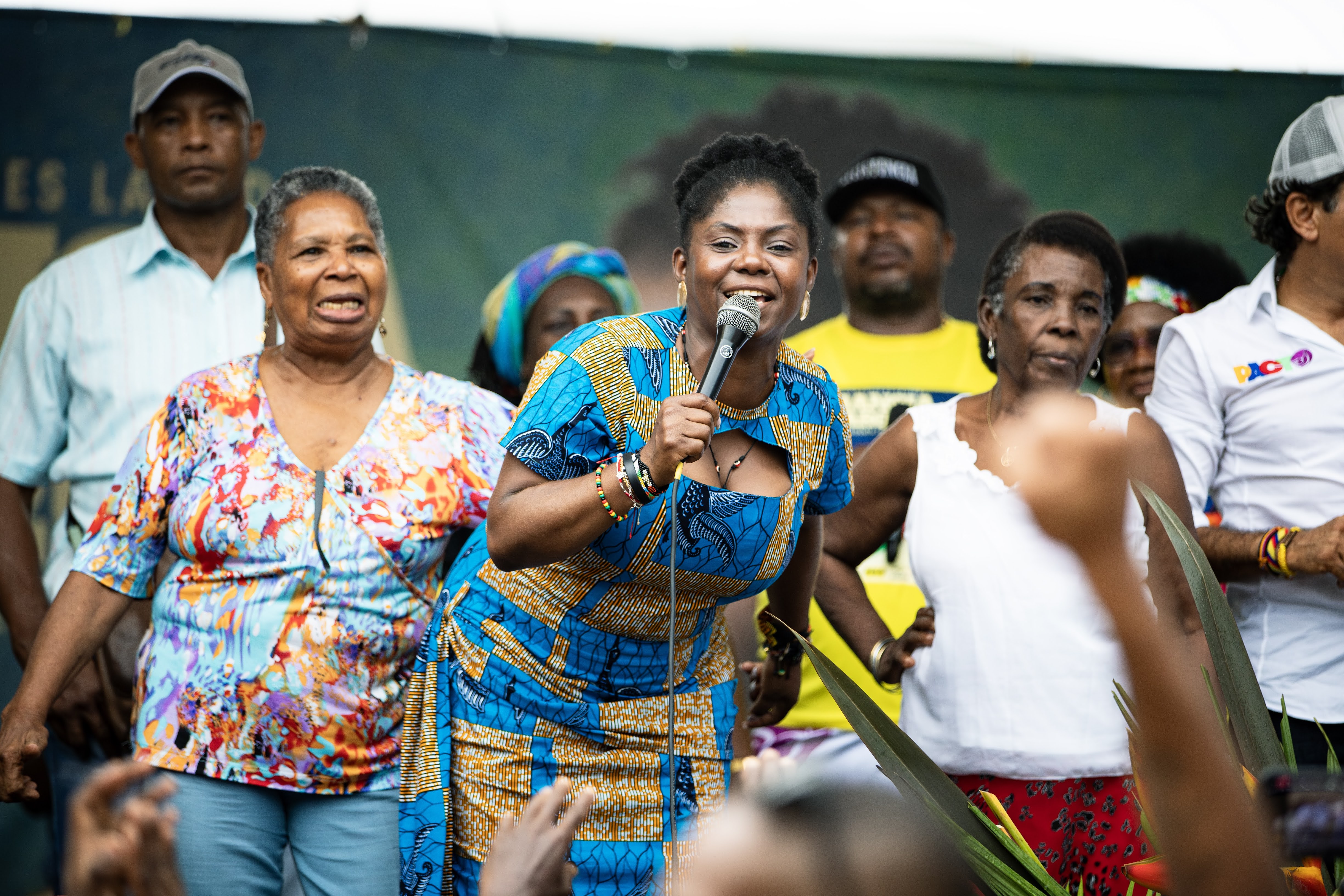
Igualada: Delve Deeper
This list of fiction and nonfiction books, compiled by Kim Dorman, Community Engagement Coordinator of Princeton Public Library, and retired librarian Susan Conlon, provides a range of perspectives on the issues raised by the POV documentary Igualada: Refusing to Know Your Place.
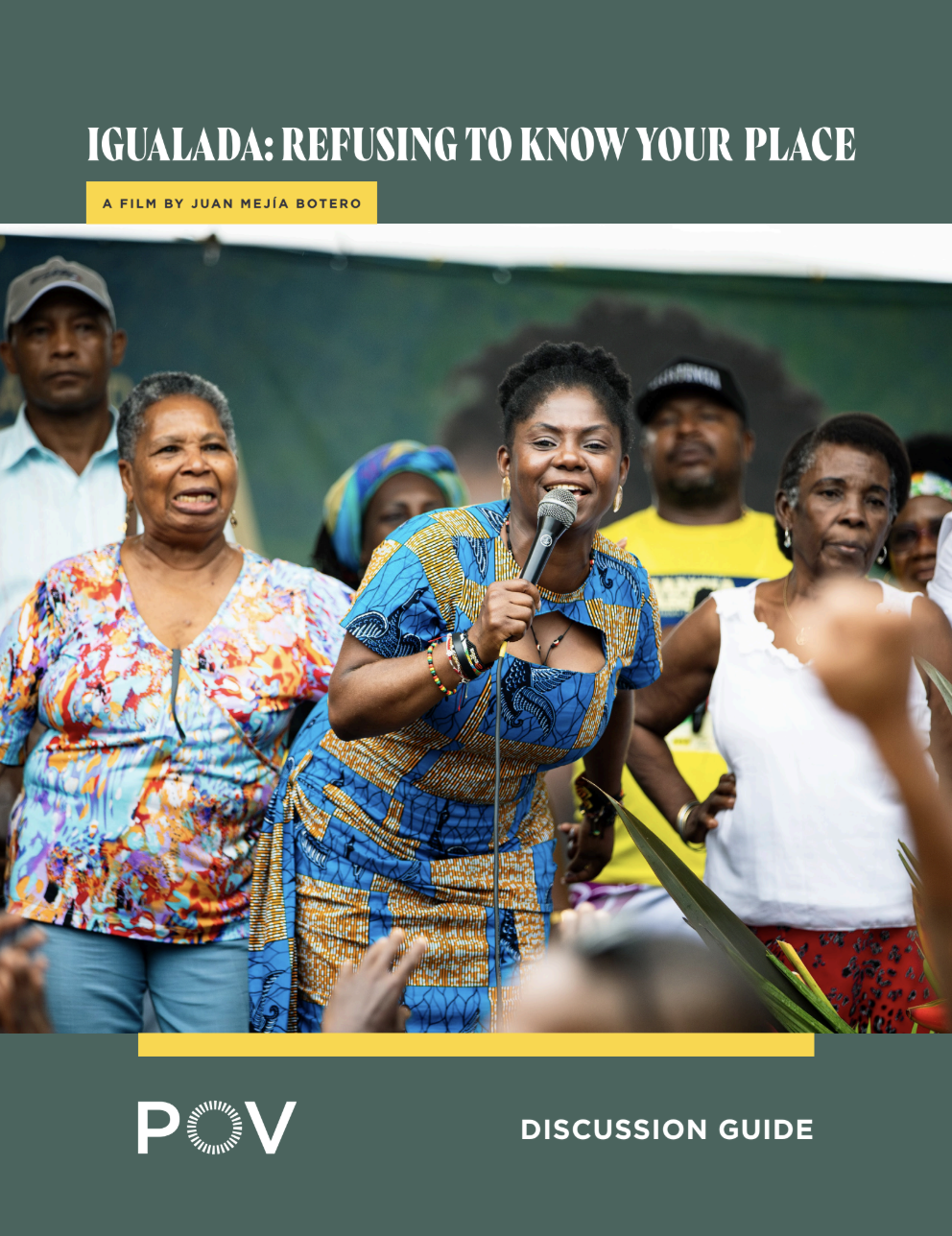
Igualada: Discussion Guide
This guide is an invitation to dialogue. It is based on a belief in the power of human connection and is designed for people who want to use Igualada: Refusing to Know Your Place to engage family, friends, classmates, colleagues, and communities. In contrast to initiatives that foster debates in which participants try to convince others that they are right, this document envisions conversations undertaken in a spirit of openness in which people try to understand one another and expand their thinking by sharing viewpoints and listening actively.
The discussion prompts are intentionally crafted to help a wide range of audiences think more deeply about the issues in the film. Rather than attempting to address them all, choose one or two that best meet your needs and interests. Be sure to leave time to consider taking action. Planning next steps can help people leave the room feeling energized and optimistic, even in instances when conversations have been difficult.
For more detailed event planning and facilitation tips, visit https://communitynetwork.amdoc.org/.
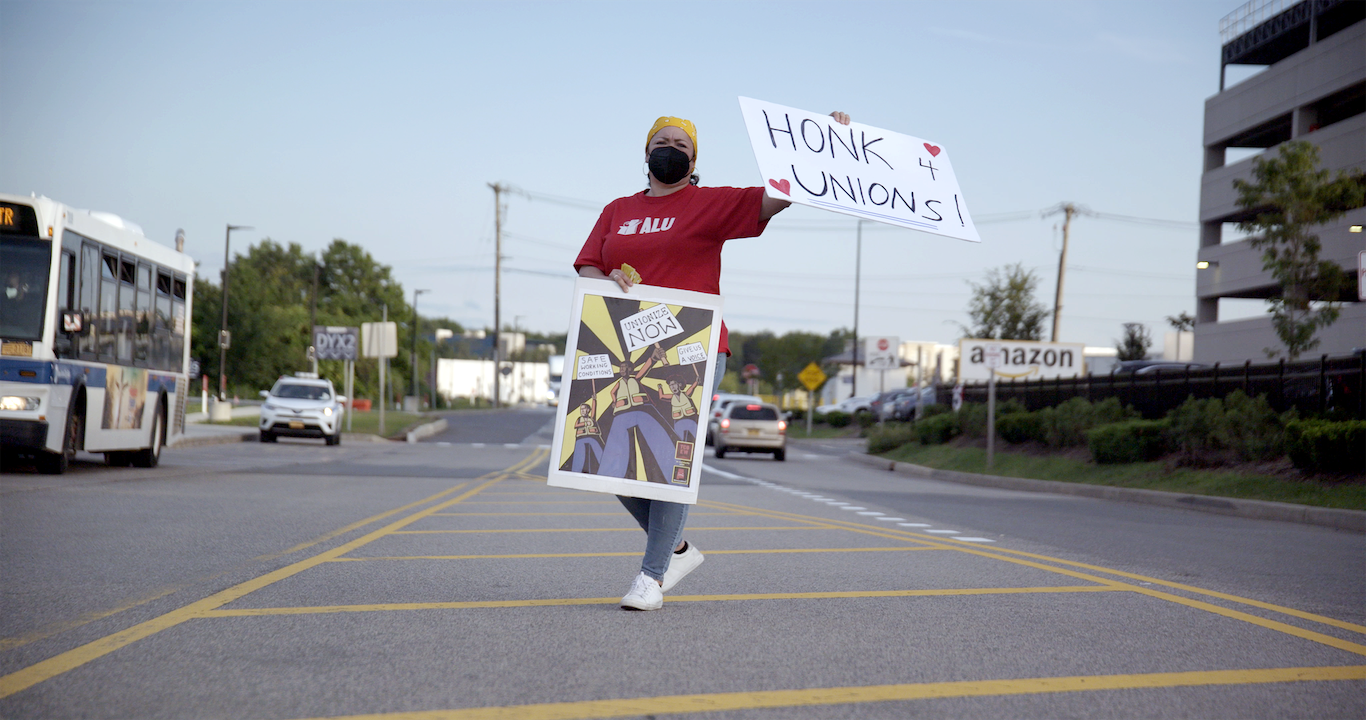
UNION: Delve Deeper
This list of fiction and nonfiction books, compiled by Ann Howard, Library Branch Manager, MIS, provides a range of perspectives on the issues raised by the POV documentary Union.
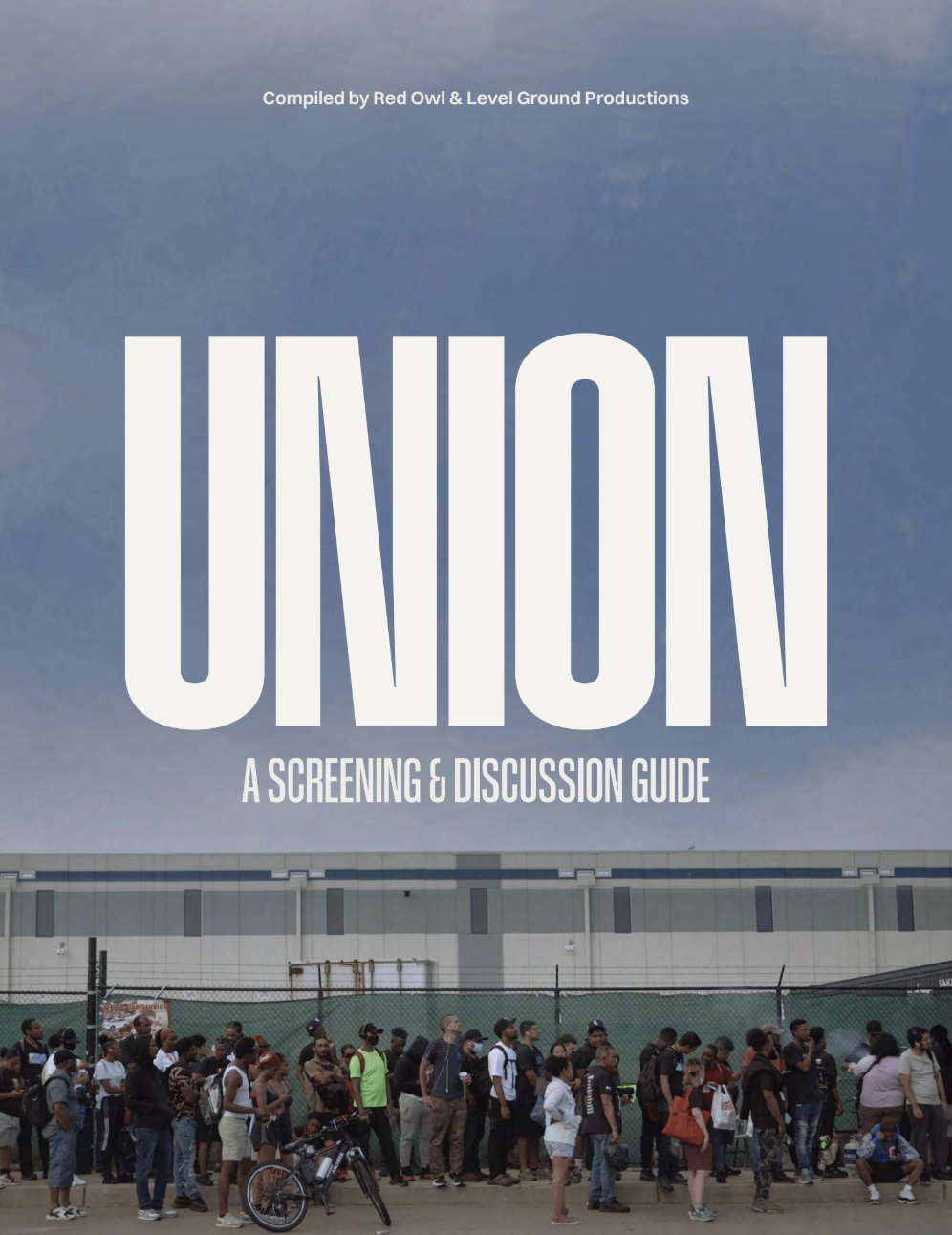
UNION: Discussion Guide
This discussion guide is designed to give you the tools you need to host a screening of UNION that meets your specific goals. The intention is for this guide to be a wide buffet of resources to support productive dialogue, action, and education around the film’s central issues. We encourage you to read through, consider, and pull from content in any section or sections that best suit your screening event. It is not expected, nor likely that you will be able to include all the prompts, resources, or materials present in this guide at your event. You are encouraged to take what makes sense for your screening event and leave the rest. For more ways to take action, resources, a glossary of terms, and a full bibliography, see our reference materials. Or request a screening of the movie.

The Ride Ahead: Film Resources
THE RIDE AHEAD, from father-son co-directors Samuel Habib & Dan Habib, is the feature-length version of the Emmy Award-winning New York Times Op-Doc, My Disability Roadmap.
Visit their Resources page to access a Discussion Guide, Watch Party Kit, Screening Publicity Materials, and more.
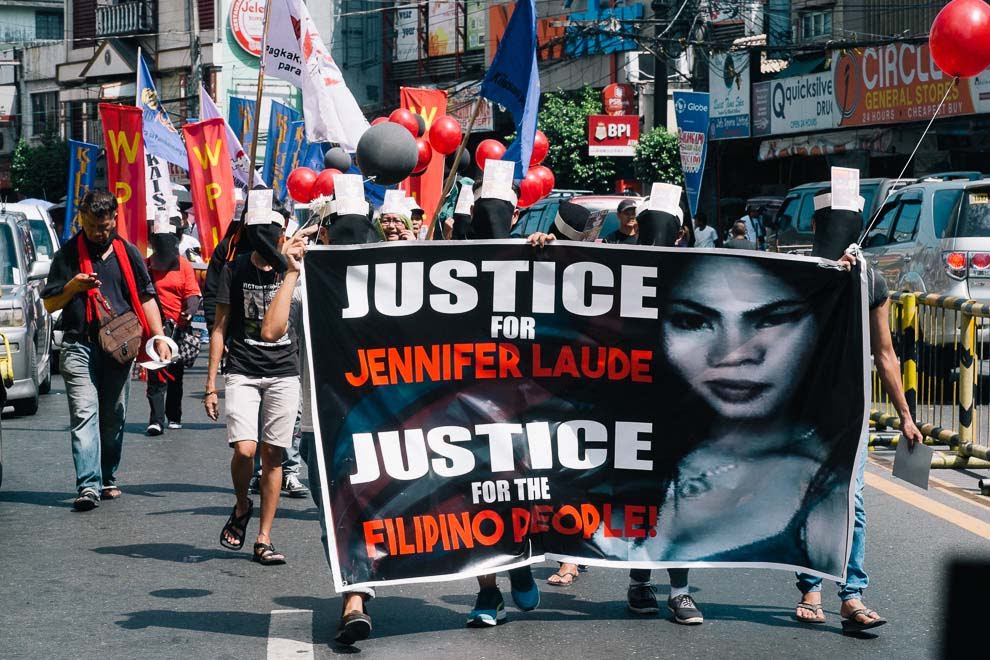
Call Her Ganda: Lesson Plan
In the documentary film Call Her Ganda we see how the legacy of U.S. imperialism persists in the form of ongoing U.S. military presence in the Philippines and legal protections afforded to U.S. military personnel who commit crimes on Filipino soil. Call Her Ganda reveals the injustices and imbalance of power inherent in this legacy and how it leads to violence against the Filipino population in general and, in the case of Jennifer Laude,the historical erasure and degradation of transgender identity and the inability of the Filipino people to fight for their right to punish violent crimes committed against them on their own shores. In this lesson students will study how the history of the U.S. military presence in the Philippines has an impact on families like the Laudes and how the murder of Jennifer “Ganda” Laude reveals the tragic intersection of imperialism, gender, transphobia and violence.
Lesson Summary
The United States has a history of imperialism that was intended to increase military reach, expand U.S. markets,identify and exploit cheap labor and resources and spread American culture and ideals. The policy and ideology of imperialism have led to devastating results for the economies and cultures of colonized nations around the world, including the Philippines. Inherent to a doctrine of imperialism is a suppression of indigenous cultures and, according to historian Kristin Hoganson, author of Fighting for American Manhood: How Gender PoliticsProvoked the Spanish-American and Philippine-American Wars, a gender-based exercise of power.In the documentary film Call Her Ganda we see how the legacy of U.S. imperialism persists in the form of ongoing U.S. military presence in the Philippines and legal protections afforded to U.S. military personnel who commit crimes on Filipino soil. Call Her Ganda reveals the injustices and imbalance of power inherent in this legacy and how it leads to violence against the Filipino population in general and, in the case of Jennifer Laude,the historical erasure and degradation of transgender identity and the inability of the Filipino people to fight for their right to punish violent crimes committed against them on their own shores.In this lesson students will study how the history of the U.S. military presence in the Philippines has an impac ton families like the Laudes and how the murder of Jennifer “Ganda” Laude reveals the tragic intersection of imperialism, gender, transphobia and violence.

Jardines: Discussion Guide
Jardines is an intimate portrait of the experiences and trajectories unique to displaced queer folks as they flee violence and persecution in their home countries. The film introduces us to people from all over the world as they contemplate the uncertainty of a future in the United States at a time when asylum legislation and LGBTQ+ rights are under legal duress.

Water Warriors: Lesson Plan
When an energy company begins searching for natural gas in New Brunswick, Canada, indigenous and white families unite to drive out the company in a campaign to protect their water and way of life. In this lesson, students work collaboratively in groups to explore specific clips of the documentary, become experts in that particular segment, and teach it to other members of their group and their class.
Enduring Understanding:
Water is a life-sustaining necessity that while some communities fight to preserve others allow greed to quench its undeniable importance.
Objectives:
In this lesson, students will:
- Evaluate the practice of fracking and the impact it has on ecological systems, particularly the natural water supply in New Brunswick, Canada.
- Draw conclusions about the intersection of monetary gain and environmental consciousness.
- Examine and become experts in a particular section of the documentary for the purpose of teaching that section and its content to other members of their class community.
Materials:
- Laptops
- Access to the short film Water Warriors
- Headphones
- Worksheet
- Pen/Pencil
Essential Question:
Where do ecological justice and indigenous rights fit into the paradigm for the fight for human rights globally?
Supplemental Material:
UN Sustainable Development Goal 6: Ensure availability and sustainable management of water and sanitation for all: https://sustainabledevelopment.un.org/sdg6
Proposed Grade Levels: 7-12
Time Frame: 90 minutes
Content Areas:
- Environmental Justice
- Humanities / Human Rights
- English Language Arts
- Civil Engineering
- Short Film Studies

Manzanar, Diverted: Tools for Facilitation
Preparing to Facilitate
Participants will arrive with differing degrees of knowledge and lived experience with regards to the many topics that Manzanar, Diverted invites you to explore. It is helpful to prepare yourself and ground yourself in both knowledge and intention ahead of facilitation. As a facilitator we encourage you to take the necessary steps to ensure that you are prepared to guide a conversation that prioritizes the safety of those whose experiences and identities have been marginalized. This will allow you to set an intention (and sustain a generative dialogue) that maximizes care and critical curiosity, transformation, and connection.
The following are tools to support you and your community before, during, and after the screening + discussion.
Helpful Concepts, Definition, and Language for Framing
Settler Colonialism: The goal of settler colonialism is the removal and erasure of Indigenous peoples to take and use land indefinitely, and to establish property rights over land and resources. According to the “Settler Colonialism Primer,” by Laura Hurwitz & Shawn Bourque, “settler colonialism is not just a vicious thing of the past, such as the gold rush, but exists as long as settlers are living on appropriated land and thus exists today.” An ongoing structure, settler colonialism has sought to gain control over land, space, resources, and people by illegally occupying land then establishing coercive labor systems to extract resources from the land and establish economic infrastructure.
A settler is anyone who isn’t Indigenous and lives on the stolen land that we now refer to as the United States of America. However, under settler colonialism, groups are racialized in different ways according to the economic needs of the settler state. Some peoples were brought to settler states due to chattel slavery or indentured servitude. Others are descendents of European settlers.
Tribal Sovereignty: According to the National Congress of American Indians, “Tribal members are citizens of three sovereigns: their tribe, the United States, and the state in which they reside.” Tribal sovereignty is defined as, “the ability to govern and to protect and enhance the health, safety, and welfare of tribal citizens within a tribal territory. Tribal governments maintain the power to determine their own government structures and enforce laws through police departments and tribal courts.”
Counter-Narratives: Counter-narratives are stories that challenge widespread beliefs and discourses (Solórzano & Yosso, 2001). They often serve as powerful and rich data sources to present and elevate the voices of historically marginalized communities that have been left out, erased, or made invisible in the mainstream discourse.
White Supremacy: White supremacy is the source of race based violence, and it has also shaped the mainstream environmental movement and perceptions about conservation. White supremacy is an ideology promoting white people and the ideas, thoughts, and beliefs and actions of white people as superior to those of people of color. The systems of white supremacy also refers to interlocking institutions and systems: Political, educational, social, cultural and more. Within these systems, white people have a structural advantage, individually and collectively. White supremacy is ingrained within systems, including the environmental movement with prominent white male founders. American environmentalism’s roots have long standing prejudices against local communities and Indigenous peoples, and have historically prioritized conservation of “wild places” at the expense of people who live there. Local people are often written out of conservation narratives, which the environmental justice movement sought to change.
Environmental Racism: Dr. Robert Bullard, a leader of the environmental justice movement, defines environmental racism as “any policy, practice or directive that differentially affects or disadvantages (where intended or unintended) individuals, groups or communities based on race.”
Environmental Justice: The environmental justice movement began over thirty years ago at the First National People of Color Leadership Summit, where a delegation drafted the following:
These principles and practices significantly redefined and reconceptualized our understanding of the “environment,” and shifted from the environment being considered “pristine natural wilderness” to areas where people (particularly people of color), live, work, study, play, and pray. This subsequently allowed for the inclusion of issues such as toxic pollution, transportation, worker safety, and environmental health. The environmental justice movement seeks to connect the dots between environmental, economic, social, and racial justices. Environmental justice is the movement’s response to instances of environmental racism.
Japanese American World War II Incarceration: According to Densho’s Terminology Guide, the term “internment” that was used historically, fails to accurately describe what unjustly and illegally happened to Japanese Americans during World War II. “Incarceration” is the suggested and more accurate term. The Associated Press Stylebook, 56th Edition, (a guide for newsrooms, journalists, and reporters), was recently updated to reflect a terminology change from “internment” to “incarceration.”

Who Killed Vincent Chin Discussion Guide
FILM SUMMARY
On a hot summer night in Detroit in 1982, Ronald Ebens, a Chrysler foreman, killed Vincent Chin, a young Chinese American engineering draftsman, with a baseball bat. Ebens’ stepson Michael Nitz, a laid-off autoworker, held Vincent in a bear hug while Ebens brutally bludgeoned him to death. Although Ebens and Nitz pled guilty to manslaughter, they never spent a day in jail. This gripping Academy Award-nominated film relentlessly probes the legacy of Asian American activism and the implications of the murder—for the families of those involved and for the American justice system.
USING THIS GUIDE
This guide is an invitation to dialogue. It is based on a belief in the power of human connection and designed for people who want to use Who Killed Vincent Chin? to engage family, friends, classmates, colleagues, and communities. In contrast to initiatives that foster debates in which participants try to convince others that they are right, this document envisions conversations undertaken in a spirit of openness in which people try to understand one another and expand their thinking by sharing viewpoints and listening actively.
The discussion prompts are intentionally crafted to help a wide range of audiences think more deeply about the issues in the film. Rather than attempting to address them all, choose one or two that best meet your needs and interests. And be sure to leave time to consider taking action. Planning next steps can help people leave the room feeling energized and optimistic, even in instances when conversations have been difficult.
Please be advised that there are a number of disturbing scenes of violence, sexuality, and racist depictions. In terms of language, be aware of profanity and racial slurs throughout the film. Referring to anyone of Asian descent as “oriental” or a Japanese/Japanese American as a “Jap” is inappropriate and racist.
For more detailed event planning and facilitation tips, visit https://communitynetwork.amdoc.org/.

President Delve Deeper
These suggested readings provide a range of perspectives on issues raised by the POV documentaryPresident and allow for deeper engagement. Compiled by Sarah Burris from Bay County Public Library.
Adult Non-Fiction
Birch, Sarah. Electoral Violence, Corruption, and Political Order.Princeton University Press, 2022.
Throughout their history, political elections have been threatened by conflict, and the use of force has in the past several decades been an integral part of electoral processes in a significant number of contemporary states. However, the study of elections has yet to produce a comprehensive account of electoral violence. Drawing on cross-national data sets together with fourteen detailed case studies from around the world, Electoral Violence, Corruption, and Political Order offers a global comparative analysis of violent electoral practices since the Second World War.
Cheeseman, Nic and Brian Klaas. How to Rig and Election.Yale University Press, 2018.
Contrary to what is commonly believed, authoritarian leaders who agree to hold elections are generally able to remain in power longer than autocrats who refuse to allow the populace to vote. In this engaging and provocative book, Nic Cheeseman and Brian Klaas expose the limitations of national elections as a means of promoting democratization, and reveal the six essential strategies that dictators use to undermine the electoral process in order to guarantee victory for themselves. Based on their firsthand experiences as election watchers and their hundreds of interviews with presidents, prime ministers, diplomats, election officials, and conspirators, Cheeseman and Klaas document instances of election rigging from Argentina to Zimbabwe, including notable examples from Brazil, India, Nigeria, Russia, and the United States.
Coltart, David. The Struggle Continues: 50 Years of Tyranny in Zimbabwe. Jacana Media, 2016.
David Coltart is one of the most prominent political and human rights figures in Zimbabwe. In 2000, he was elected to Parliament and, following the creation of a ‘coalition’ government in September 2008, he was appointed Minister of Education, Sport, Arts and Culture, a position he held until August 2013. Over the years, Coltart has been threatened, detained, spuriously prosecuted and has survived several direct attempts on his life. For three decades, Coltart has kept detailed notes and records of all his work, including a meticulous diary of Cabinet dealings, the source material for much of his book.
Frantz, Erica. Authoritarianism: What Everyone Needs to Know®.Oxford University Press, 2018.
Despite the spread of democratization following the Cold War's end, all signs indicate that we are living through an era of resurgent authoritarianism. Around 40 percent of the world's people live under some form of authoritarian rule, and authoritarian regimes govern about a third of the world's countries. In Authoritarianism: What Everyone Needs to Know®, Erica Frantz guides us through today's authoritarian wave, explaining how it came to be and what its features are. She also looks at authoritarians themselves, focusing in particular on the techniques they use to take power, the strategies they use to survive, and how they fall. Understanding how politics works in authoritarian regimes and recognizing the factors that either give rise to them or trigger their downfall is ever-more important given current global trends, and this book paves the ways for such an understanding.
Fuller, Alexandra. Don’t Let’s Go to the Dogs Tonight: An African Childhood.Random House, 2001.
From 1972 to 1990, Alexandra Fuller–known to friends and family as Bobo–grew up on several farms in southern and central Africa. Her father joined up on the side of the white government in the Rhodesian civil war, and was often away fighting against the powerful black guerilla factions. Her mother, in turn, flung herself at their African life and its rugged farm work with the same passion and maniacal energy she brought to everything else. Though she loved her children, she was no hand-holder and had little tolerance for neediness. She nurtured her daughters in other ways: She taught them, by example, to be resilient and self-sufficient, to have strong wills and strong opinions, and to embrace life wholeheartedly, despite and because of difficult circumstances. And she instilled in Bobo, particularly, a love of reading and of storytelling that proved to be her salvation.
Godwin, Peter. The Fear: Robert Mugabe and the Martyrdom of Zimbabwe. Little, Brown and Company, 2011.
Journalist Peter Godwin has covered wars. As a soldier, he's fought them. But nothing prepared him for the surreal mix of desperation and hope he encountered when he returned to Zimbabwe, his broken homeland. Godwin arrived as Robert Mugabe, the country's dictator for 30 years, has finally lost an election. Mugabe's tenure has left Zimbabwe with the world's highest rate of inflation and the shortest life span. Instead of conceding power, Mugabe launched a brutal campaign of terror against his own citizens. With foreign correspondents banned, and he himself there illegally, Godwin was one of the few observers to bear witness to this period the locals call The Fear. He saw torture bases and the burning villages but was most awed as an observer of not only simple acts of kindness but also churchmen and diplomats putting their own lives on the line to try to stop the carnage.
Holland, Heidi. Dinner with Mugabe: The Untold Story of a Freedom Fighter who Became a Tyrant.Penguin Global, 2008.
With plunging life expectancy, soaring inflation, and unemployment, repression, and starvation fueling a mass exodus, Zimbabwe is a nation in crisis. Its president, Robert Mugabe-once lauded for his heroics as a guerilla leader who fought against white-minority rule in the 1960s- is now seen as the man who ruined the country and cast shame on the African continent. Beginning with a dinner shared with Mugabe the freedom fighter and ending in a searching interview with Mugabe as Zimbabwe's president more than thirty years later, Heidi Holland's incisive and timely investigation charts Mugabe's gradual self- destruction and probes the mystery of Africa's loyalty to one of its worst dictators.
Kenyon, Paul. Dictatorland: The Men Who Stole Africa.Head of Zeus, 2018.
The austere, incorruptible leader who has shut Eritrea off from the world in a permanent state of war and conscripted every adult into the armed forces. In Equatorial Guinea, the paranoid despot who thought Hitler was the savior of Africa and waged a relentless campaign of terror against his own people. The Libyan army officer who authored a new work of political philosophy, The Green Book, and lived in a tent with a harem of female soldiers, running his country like a mafia family business. And behind these almost incredible stories of fantastic violence and excess lie the dark secrets of Western greed and complicity, the insatiable taste for chocolate, oil, diamonds and gold that has encouraged dictators to rule with an iron hand, siphoning off their share of the action into mansions in Paris and banks in Zurich and keeping their people in dire poverty.
Perry, Alex. The Rift: A New Africa Breaks Free.Little, Brown and Company, 2015.
Africa has long been misunderstood and abused by outsiders. Correspondent Alex Perry traveled the continent for most of a decade, meeting with entrepreneurs and warlords, professors and cocaine smugglers, presidents and jihadis. Beginning with a devastating investigation into a largely unreported war crime-in 2011, when the US and the major aid agencies helped cause a famine in which 250,000 Somalis died-he finds Africa at a moment of furious self-assertion. To finally win their freedom, Africans must confront three last false prophets-Islamists, dictators and aid workers-who would keep them in their bonds. Beautifully written, intimately reported, and sure to spark debate, The Rift passionately argues that a changing Africa revolutionizes our ideas of it, and of ourselves.
Rogers, Douglas. The Last Resort: A Memoir of Mischief and Mayhem on a Family Farm in Africa.Crown, 2009.
Born and raised in Zimbabwe, Douglas Rogers is the son of white farmers living through that country’s long and tense transition from postcolonial rule. He escaped the dull future mapped out for him by his parents for one of adventure and excitement in Europe and the United States. But when Zimbabwe’s president Robert Mugabe launched his violent program to reclaim white-owned land and Rogers’s parents were caught in the cross fire, everything changed. Lyn and Ros, the owners of Drifters–a famous game farm and backpacker lodge in the eastern mountains that was one of the most popular budget resorts in the country–found their home and resort under siege, their friends and neighbors expelled, and their lives in danger. But instead of leaving, as their son pleads with them to do, they haul out a shotgun and decide to stay.
Rogers, Douglas. Two Weeks in November: The Astonishing Untold Story of the Operations that toppled Mugabe.Short Books Ltd., 2019.
Two Weeks in November is the thrilling, surreal, unbelievable and often very funny true story of four would-be enemies - a high ranking politician, an exiled human rights lawyer, a dangerous spy and a low-key white businessman turned political fixer - who team up to help unseat one of Africa's longest serving dictators, Robert Mugabe. What begins as an improbable adventure destined for failure, marked by a mixture of bravery, strategic cunning and bumbling naivete, soon turns into the most sophisticated political-military operation in African history. By virtue of their being together, the unlikely team of misfit rivals is suddenly in position to spin what might have been seen as an illegal coup into a mass popular uprising that the world and millions of Zimbabweans will enthusiastically support.
Ndlovu, Ray. In the Jaws of the Crocodile: Emmerson Mnangagwa’s Rise to Power in Zimbabwe.Penguin Random House South Africa, 2019.
The fall of Robert Mugabe and the inauguration of Emmerson Mnangagwa as Zimbabwe’s new president in November 2017 were events that no one could have predicted. Just three weeks earlier, Mugabe had sacked Mnangagwa as vice president, a move that seemed to end the long political career of the man known as ‘The Crocodile’. From exile in South Africa, where he had been forced to flee for his life, Mnangagwa made a statement telling Mugabe that he would return ‘in a matter of weeks’ to take control of the levers of power in government and in ZANU-PF. It was a journey with little guarantee of success. However, family members, business associates and allies took serious risks to support him, while a nation squeezed by dire economic meltdown and a deep longing for new leadership raised the stakes and demonstrated against Mugabe after a military intervention.
Nyamayaro, Elizabeth. I am a Girl from Africa: a Memoir. Scribner, 2021.
When severe drought hit her village in Zimbabwe, Elizabeth, then eight, had no idea that this moment of utter devastation would come to define her life purpose. Unable to move from hunger, she encountered a United Nations aid worker who gave her a bowl of warm porridge and saved her life. This transformative moment inspired Elizabeth to become a humanitarian, and she vowed to dedicate her life to giving back to her community, her continent, and the world. Grounded by the African concept of ubuntu "I am because we are," I Am a Girl from Africa charts Elizabeth's quest in pursuit of her dream from the small village of Goromonzi to Harare, London, New York, and beyond, where she eventually became a Senior Advisor at the United Nations and launched HeForShe, one of the world's largest global solidarity movements for gender equality.
Sithole, Ndabaningi. African Nationalism, 3rd Edition.Ndabaningi Sithole Foundation, 2022.
What was the fight for Africa's independence all about? Was it just about majority rule? Was it to replace foreign economic and political systems with home-grown African systems or for Africa to remain with and/or adopt foreign systems? In African Nationalism, the late African freedom fighter Reverend Ndabaningi Sithole presents a compelling account of why Africans sought their independence and his vision of a system that would be ideal for Africa's governance.
Tendi, Blessing-Miles. The Army and Politics in Zimbabwe: Mujuru, the Liberation Fighter and Kingmaker.Cambridge University Press, 2020.
An illustrious African liberation fighter in the 1970s and, until his suspicious death in 2011, an important figure in Robert Mugabe's ruling ZANU-PF party in Zimbabwe, this first full-length biography of General Solomon Mujuru or Rex Nhongo throws much needed light onto the opaque elite politics of the 1970s liberation struggle, post-independence army and ZANU-PF. Based on the unparalleled primary interviews with informants in the army, intelligence services, police and ZANU PF elites, Blessing-Miles Tendi examines Mujuru's moments of triumph and his shortcomings in equal measure. From his undistinguished youth and poor upbringing in colonial Rhodesia's Chikomba region, his rapid rise to power, and role as the first black commander of independent Zimbabwe's national army, this is an essential record of one of the most controversial figures within the history of African liberation politics.

Manzanar, Diverted When Water Becomes Dust Lesson Plan | Resistance & Coalition Building for Environmental Justice
Manzanar, Diverted: When Water Becomes Dust, a documentary film by Director/Producer Ann Kaneko and Producer/Impact Producer Jin Yoo-Kim, tells the story of historical dispossession: dispossession of Indigenous lands; forced removal and incarceration of Japanese Americans during World War II; and extraction and commodification of natural resources, which has adversely impacted ranchers and farmers. In the present, three communities rise up in resistance and form coalitions to defend, sustain, and protect land and water rights. This lesson provides a critical framework for understanding and analyzing the historical human-environment interactions related to forced removals, specifically at Manzanar and Payahuunadü. Understanding this history will provide a foundation to identify and analyze the forms of resistance like nature, joy and humor.
This lesson looks to the past so that students can take action for social and environmental justice in the present. Students will make connections to the environmental justice movement and will learn about the Principles of Environmental Justice and the Principles of Working Together. Students will then directly apply and utilize research skills and community knowledge to begin to build environmental and climate justice campaigns as a culminating project. The lesson is interdisciplinary, and can be completed over three to four 45-minute class periods with optional homework in between.
